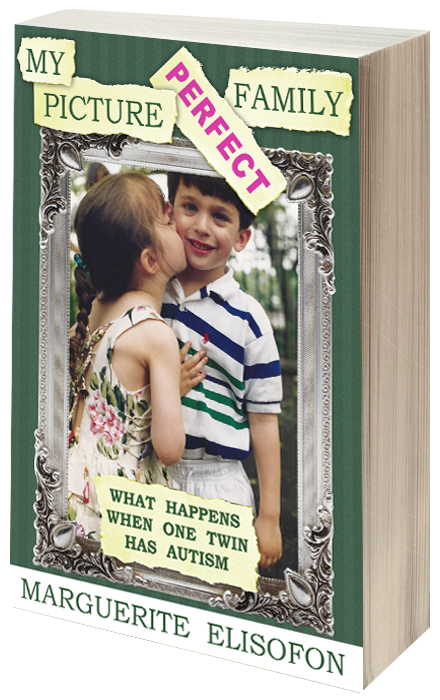 As the parent of a daughter on the autism spectrum (now 26) and author of a memoir about raising her and her ADHD twin brother, I’m SUPER aware of the crisis in ALL support services for adults with disabilities. That’s why I found it VERY frustrating to read The Crisis in Mental Health Services for Young Adults on the Autism Spectrum by Lee Wilkinson, Ph.D. While the author of this blog (bestpractice.autism.com) boasts impressive credentials and has been honored for having a “top 50 autism blog,” his October 1st post—while no doubt scrupulously accurate—is hardly breaking news.
As the parent of a daughter on the autism spectrum (now 26) and author of a memoir about raising her and her ADHD twin brother, I’m SUPER aware of the crisis in ALL support services for adults with disabilities. That’s why I found it VERY frustrating to read The Crisis in Mental Health Services for Young Adults on the Autism Spectrum by Lee Wilkinson, Ph.D. While the author of this blog (bestpractice.autism.com) boasts impressive credentials and has been honored for having a “top 50 autism blog,” his October 1st post—while no doubt scrupulously accurate—is hardly breaking news.
You don’t need a Ph.D. to know that young adults transitioning out of structured educational settings are “at increased risk of developing depression and anxiety.” Just ask any autism parent. Wilkinson seems puzzled by the idea that despite obvious mental health risks, “very few studies have examined treatment approaches and intervention for adolescents and adults with autism spectrum conditions.” Why not? There are many answers to this question, depending on who you ask and what books you read.
From my observation, Autism Speaks seems most heavily invested in finding ways to prevent and “cure” autism. Their priority is research and studies that may help unborn children in the future, along with offering effective treatment options for young children. Although I’m grateful for whatever groundbreaking research Autism Speaks may be spearheading, I can’t help wishing more attention and energy went toward the current generation, as well as their aging parents. What about millennials with autism? They are a huge and growing minority.
 NeuroTribes by Steve Silberman traces the complex history of autism and argues that the autistic spectrum is as old as mankind. While the research quoted in NeuroTribes did not provide practical day-to-day help for people on the spectrum, the book changed the public’s perception of autism with a profound analysis of human history, in addition to statistics and studies. Furthermore, the book lifted the self-esteem for readers on the spectrum and sent ripples of hope and pride to their families and friends. NeuroTribes concludes by emphasizing the need to care for and appreciate individuals living with autism, instead of seeking to prevent them from ever being born. (!)
NeuroTribes by Steve Silberman traces the complex history of autism and argues that the autistic spectrum is as old as mankind. While the research quoted in NeuroTribes did not provide practical day-to-day help for people on the spectrum, the book changed the public’s perception of autism with a profound analysis of human history, in addition to statistics and studies. Furthermore, the book lifted the self-esteem for readers on the spectrum and sent ripples of hope and pride to their families and friends. NeuroTribes concludes by emphasizing the need to care for and appreciate individuals living with autism, instead of seeking to prevent them from ever being born. (!)
Our society needs to prioritize the needs of people living with autism over autism prevention. NeuroTribes points out that the autistic perspective has offered special gifts to mankind for centuries in the form of scientific inventions and discoveries. Today’s researchers should not be focused on preventing the ancient autistic neurotype. We should direct our efforts toward recognizing and integrating this human mind style. The autism community needs to focus on supporting adults on the spectrum in leading meaningful lives NOW. Of course, researchers should also continue to explore risk factors for autism while collecting educational and cultural data that helps us see beyond stereotypes and stigmas.
In my opinion, too much time and money has been spent on autism debate and theory. Let’s invest more financial and intellectual effort into life skills support, job training, work place accommodations, and affordable housing for people struggling with autism in the here and now. That way we will also be providing relief to the families and friends who are caring for a loved one on the spectrum. Actions still speak louder than words.





 Marguerite Elisofon is a New York City writer and the author of My Picture Perfect Family, a memoir about how her family navigated life with a child on the autistic spectrum before the internet and support groups existed. She also blogs about parenting young adults and disability related issues in The Never Empty Nest. Her writing has been featured in a variety of publications, including Time and NY Metro Parents magazine, and her family’s story has been featured by the NY Post, Fox News, The Daily Mail, and on Jenny McCarthy’s Dirty Sexy Funny radio show. A Vassar graduate, Marguerite was born and raised in New York City, where she still lives with her husband, Howard, in their mostly-empty nest. She is available to speak about a wide variety of issues relating to twins, parenting, and autism.
Marguerite Elisofon is a New York City writer and the author of My Picture Perfect Family, a memoir about how her family navigated life with a child on the autistic spectrum before the internet and support groups existed. She also blogs about parenting young adults and disability related issues in The Never Empty Nest. Her writing has been featured in a variety of publications, including Time and NY Metro Parents magazine, and her family’s story has been featured by the NY Post, Fox News, The Daily Mail, and on Jenny McCarthy’s Dirty Sexy Funny radio show. A Vassar graduate, Marguerite was born and raised in New York City, where she still lives with her husband, Howard, in their mostly-empty nest. She is available to speak about a wide variety of issues relating to twins, parenting, and autism. 
The blog post you refer to is based on the findings and recommendations contained in the following article: Johanna K. Lake, J. K., Perry, A., & Lunsky, Y. (2014). Mental Health Services for Individuals with High Functioning Autism Spectrum Disorder. Autism Research and Treatment, Volume 2014, Article ID 502420. https://dx.doi.org/10.1155/2014/502420. Please don’t hesitate to contact the authors with your comments. I’m sure you understand that research articles such as this help bring attention to the mental issues faced by many young adults on the autism spectrum.
Yes, I understand that research articles are helpful and well-intentioned. But as the mother of a fairly high-functioning daughter on the spectrum, I would like for my daughter and her friends to get job training, life skills support, and affordable housing. Since most of these young adults are not able to move forward in an independent, meaningful way, it’s not surprising that many of them are depressed and anxious (right along with their parents who are struggling to support them)! I’d like to see more great minds come up with practical solutions that can be implemented NOW. I’m sure you can understand my frustration and impatience.
I would like to receive upcoming articles about adults on the spectrum.
If you would like to receive my articles about adult autism, I invite you to subscribe to The Never-Empty Nest. Most of what I write these days is inspired by my 26 year old daughter on the spectrum.
Marguerite:
I agree with you wholeheartedly. There needs to be more integration and support for adults with ASD. The higher functioning ones can work and have much to contribute. They just need more natural supports, which by the way, were more common when America had smaller and family-owned businesses. Large corporations for the most part are not friendly to people with intellectual disabilities. Acceptance of people with autism is getter better but we still have 80-90% unemployed and living with aging parents.
Yes, I know. I’m one of those aging parents (though I hope to be stick around and remain spry for awhile).
So what if they find there IS no way to prevent? All that money that’s been used for that is sort of wasted. My son is 33, I resent that he was not diagnosed until 25, that he didn’t get any of the therapies that might have made his life a little easier.
I agree with you 100%, We need to shift emphasis from the unborn to the living.
Yes we need more housing for autistic people, where are we headed, it has been a struggle, since my son came out of high school, for 24 hour supervision and housing needs, it is a lot of young autistic young adults are being abuse and neglected as well
My wife & I are struggling with the long term viability of safe & affordable housing for our son & many others like him in the community.
In addition to the pervasive problem of inadequate housing options, we also need occupational & vocational opportunities for our children.
Yes, I hear you. I’m sure it’s going to reach a crisis proportion if it hasn’t already. We must advocate and be the voices for our kids, no matter where they fall on the spectrum.